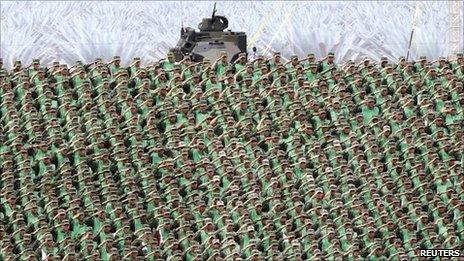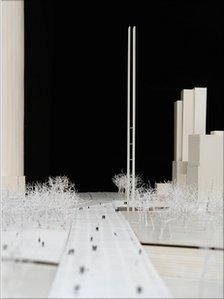Mexico independence bash mired in controversy
- Published

Mexico is celebrating 200 years of independence this week
It is the party of the century - or of two centuries. Mexico is preparing for the largest ever celebration of its independence this week.
But the run-up to the festivities to mark 200 years of independence has been marred by accusations of overspending, bad planning and security concerns.
And in a country in the midst of a drug conflict that has killed more than 28,000 people since late 2006, many think there is simply not much to celebrate.
The federal government, however, has been adamant that Mexico should use this chance to celebrate all things Mexican, sparing no expenses.
The total bill for the events, concerts and ceremonies during the whole of this year reaches $230m (£148m).
For the main event alone - a spectacular parade in Mexico City on Wednesday night, that will come to its climax with the traditional "grito" (shout of independence) by the president in the capital's main square - the tab is $45m.
According to a survey published this week by Reforma newspaper, eight out of 10 Mexico City residents think that too much money is being spent on the celebrations.
And in stark contrast to the major events planned for the capital, other cities in the country - including Ciudad Juarez, a city where 6,000 have been killed in drug-related violence in less than four years - have decided to cancel their bicentennial public events out of safety concerns.
"This kind of money could be used in lots of strategic ways, to help social development, to help public security, and to help the economic growth of the country, so it does seem a bit over the top," says John Ackerman, a political analyst at Mexico's Autonomous University.
Legacy
But for Education Secretary Alonso Lujambio, the main organiser of the events, the sombre mood in the country is no excuse not to celebrate.

The Trail of Light monument will now not be ready till late next year
"We are happy to be Mexicans, and our way to express that happiness is to celebrate and demonstrate to Mexicans and to the world that we are strong to face our problems," he told the BBC.
Mr Lujambio has been a target of strong attacks over poor planning for the event.
The case of the Trail of Light - a monument some 100m high in the capital, which would change the city's skyline and be the legacy of this year's festivities for future generations - is symbolic.
The structure, initially planned to be inaugurated this week, is still in the early stages of construction, and officials now admit that it will not be ready until late next year.
And in some other cases, the criticism is aimed, simply, at bad taste.
A song unveiled initially as the official anthem of this week's party, performed by pop singer Aleks Syntek, received a flurry of criticism.
Many said it failed at its purported aim of mixing pop tunes with Mexican genres such as mariachis and pre-Hispanic sounds.
Security concerns
But if there is one aspect that concerns Mexicans during this week's celebration, it is security.
The festivities have once before been the target of alleged members of organised crime groups.
In 2008, in the city of Morelia in the western state of Michoacan, a grenade attack during the Independence Day festivities killed seven people and injured dozens more.
That is why officials do not seem willing to take any chances: more than 14,000 police officers will guard the main event in Mexico City this year - including snipers on rooftops - and all those attending the party at the Zocalo (main square) will have to pass through metal detectors.
In places like Ciudad Juarez, however, the decision was more radical: the mayor there, Jose Reyes Ferriz, will make the "shout of independence" indoors and avoid a public gathering, since he admitted that security for a large outdoor event could not be guaranteed.
Similar measures where taken in towns in the northern states of Tamaulipas and Nuevo Leon.
This serves as a reminder that, after the hangover from the bicentennial party, Mexicans will have the harsh reality of the present to return to.